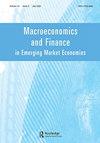在货币危机期间,企业如何管理流动性?土耳其的情况
IF 1.1
Q3 ECONOMICS
Macroeconomics and Finance in Emerging Market Economies
Pub Date : 2021-10-01
DOI:10.1080/17520843.2021.1983703
引用次数: 2
摘要
摘要本研究调查了2018年土耳其货币危机如何影响186家土耳其上市公司的流动性管理,这场危机加剧了借贷成本。研究结果表明,在危机期间之前严重依赖短期借款的公司通过减少短期借款和增加内部现金来应对危机。然而,投资水平以及贸易信贷的使用和供应在危机期间没有改变。研究结果还表明,小公司对内部现金的替代率明显高于大公司。本文章由计算机程序翻译,如有差异,请以英文原文为准。
How do firms manage liquidity during currency crisis? The case of Turkey
ABSTRACT This study investigates how the 2018-currency crisis in Turkey, which exacerbated the borrowing costs, has affected the liquidity management of a sample of 186 Turkish listed firms. The results reveal that firms that relied heavily on short-term borrowing before the crisis period have responded to the crisis by reducing short-term borrowing and increasing internal cash. However, investment levels and the use and supply of trade credit have not been changed during the crisis. The results also show that the substitution into internal cash is significantly higher for small firms than for large firms.
求助全文
通过发布文献求助,成功后即可免费获取论文全文。
去求助
来源期刊
CiteScore
2.40
自引率
7.70%
发文量
23

 求助内容:
求助内容: 应助结果提醒方式:
应助结果提醒方式:


